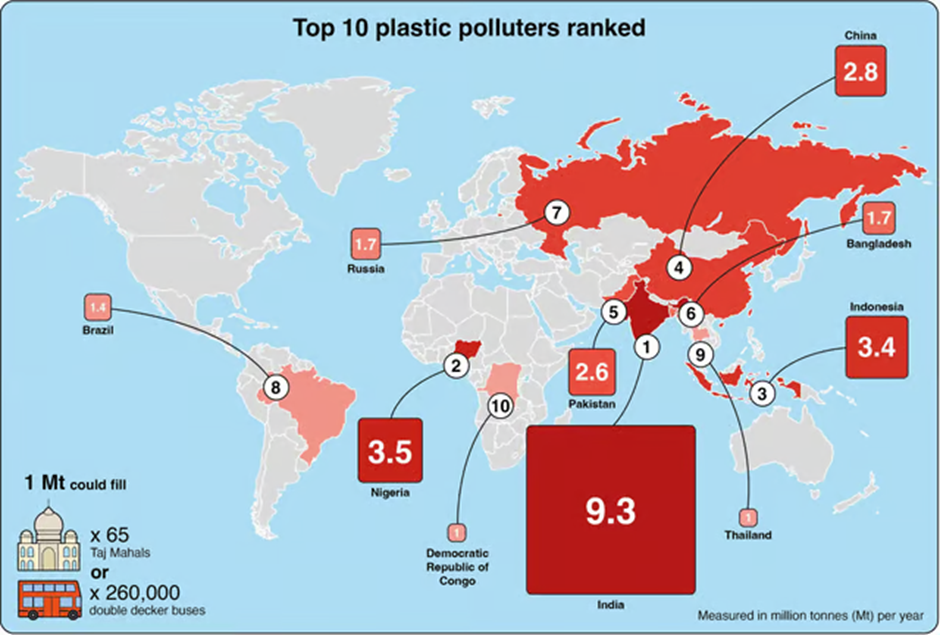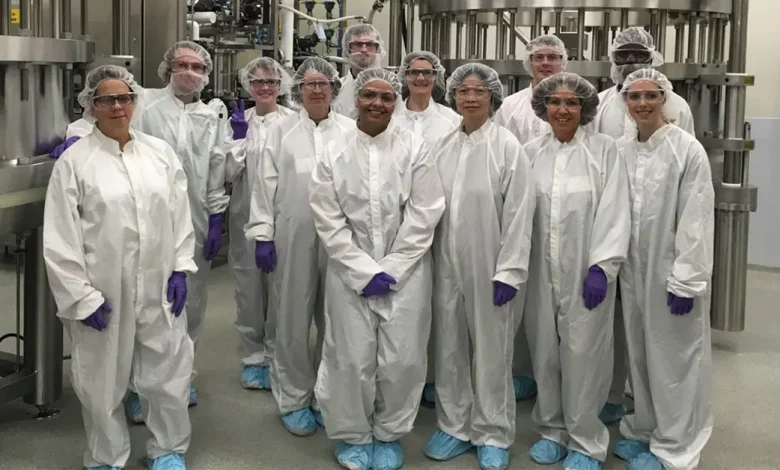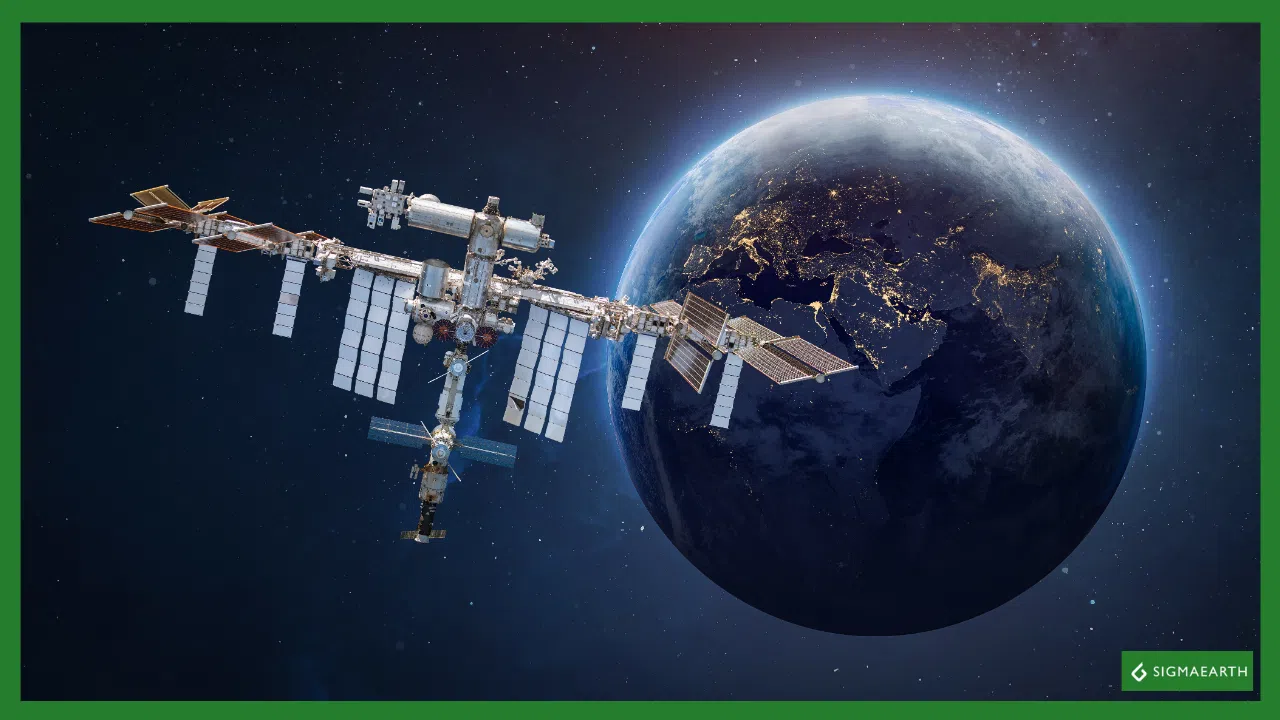- Courses
- GS Full Course 1 Year
- GS Full Course 2 Year
- GS Full Course 3 Year
- GS Full Course Till Selection
- Online Program
- GS Recorded Course
- NCERT (Recorded 500+ Hours)
- Polity Recorded Course
- Geography Recorded Course
- Economy Recorded Course
- AMAC Recorded Course
- Modern India, Post Independence & World History
- Environment Recoded Course
- Governance Recoded Course
- Science & Tech. Recoded Course
- International Relations and Internal Security Recorded Course
- Disaster Management Module Course
- Ethics Recoded Course
- Essay Recoded Course
- Current Affairs Recoded Course
- CSAT
- 5 LAYERED ARJUNA Mentorship
- Public Administration Optional
- ABOUT US
- OUR TOPPERS
- TEST SERIES
- FREE STUDY MATERIAL
- VIDEOS
- CONTACT US
India, not China, is world’s largest plastic emitter
India, not China, is world’s largest plastic emitter

A recent study published in Nature has identified India as the world's largest contributor to plastic pollution. The study highlights that India accounts for roughly 20% of the global plastic waste generated.
Key Findings of the Study:
Plastic Waste Generation:
- India produces around 9.3 million tonnes of plastic waste annually.
- Out of this, 5.8 million tonnes are incinerated, and 3.5 million tonnes end up as environmental debris.
- This rate exceeds that of Nigeria (3.5 million tonnes), Indonesia (3.4 million tonnes), and China (2.8 million tonnes).
- Per capita waste generation in India is approximately 0.12 kg per day.
Global Divide:
- Plastic waste emissions are notably high in Southern Asia, Sub-Saharan Africa, and Southeastern Asia.
- Global South countries, including India, typically use open burning for waste management, whereas the Global North relies on controlled disposal methods.
High vs. Low-Income Countries:
- 69% (35.7 million tonnes) of global plastic waste emissions come from 20 countries.
- High-income countries, while generating more plastic waste, have comprehensive waste collection and controlled disposal systems, reducing their pollution footprint.
Criticism of the Study:
- Narrow Focus: Emphasizes waste management rather than reducing plastic production.
- Misplaced Priorities: May distract from upstream solutions like banning single-use plastics.
- Industry Influence: Support from plastics industry groups may align with their interests rather than broader environmental goals.
- Undermining Comprehensive Solutions: Focus on waste management might weaken efforts to tackle production and recycling challenges.
Reasons for High Plastic Pollution in India:
- Rapid Population Growth and Urbanization: Increased consumption and waste generation due to rising population and urbanization.
- Inadequate Waste Management Infrastructure: Insufficient infrastructure to manage the large volume of waste, with more uncontrolled dumping sites than sanitary landfills.
- Discrepancies in Waste Collection Data: Official waste collection rates are overstated, with actual rates around 81% as opposed to the reported 95%.
- Open Burning of Waste: Burning 5.8 million tonnes of plastic waste annually releases toxic pollutants.
- Informal Sector Recycling: The unregulated informal sector handles a significant portion of plastic waste, complicating pollution level assessments.
Issues Associated with Mismanaged Plastic Waste:
Environmental Degradation:
- Plastic waste clogs waterways, causes flooding, and pollutes marine environments.
- Burning plastic releases toxic pollutants, worsening air quality.
Public Health Concerns:
- Microplastics in water and food pose long-term health risks.
- Plastic waste fosters disease vectors, increasing disease spread.
- Burning plastic affects respiratory health.
Economic Challenges:
- Loss of material value in plastic packaging could exceed USD 133 billion by 2030.
- Uncollected plastic packaging waste accounts for USD 68 billion in losses.
E-commerce and Packaging Waste:
- Increased plastic packaging from e-commerce is often non-recyclable.
Regulatory and Enforcement Challenges:
- Inconsistent enforcement of regulations and issues with the Extended Producer Responsibility (EPR) system impede effective waste management.
Microplastic Pollution in Agriculture:
- Inadequate wastewater treatment leads to microplastics in soil, impacting soil health and food safety.
Technological and Infrastructure Gaps:
- Limited advanced recycling technology and inadequate waste tracking hinder effective waste management.
Regulations Related to Plastic Waste Management in India:
- Plastic Waste Management Rules, 2016: Establishes guidelines for managing plastic waste.
- Plastic Waste Management (Amendment) Rules, 2018: Phases out non-recyclable multi-layered plastics and establishes a central registration system.
- Plastic Waste Management Amendment Rules, 2021: Prohibits specific single-use plastic items, enforces collection and management of plastic packaging waste, and increases plastic carry bag thickness.
- Plastic Waste Management (Amendment) Rules, 2022: Further updates to waste management regulations.
- Plastic Waste Management (Amendment) Rules, 2024: Recent amendments to the waste management framework.
Other Initiatives:
- Swachh Bharat Mission
- India Plastics Pact
- Project REPLAN
- Un-Plastic Collective
- GoLitter Partnerships Project
Way Forward:
Circular Economy:
- Promote Reduce, Reuse, and Recycle (RRR) principles in design.
- Set up recovery facilities and mandate recycled content in products.
Smart Waste Management:
- Integrate IoT, AI, and mobile apps for efficient waste management and reporting.
Extended Producer Responsibility (EPR):
- Strengthen EPR with graded fees, plastic credit trading, and extending to the informal sector.
Awareness Campaigns:
- Launch national campaigns, integrate plastic waste education in schools, and involve influencers.
Waste-to-Energy:
- Invest in advanced waste-to-energy technologies and ensure strict emissions controls.
Green Procurement:
- Apply plastic waste reduction criteria in government procurement and use government buildings as models.
Conclusion: India's status as the world's largest plastic polluter underscores a critical environmental challenge with severe implications for health, economy, and ecosystems. Despite various regulations and initiatives aimed at managing plastic waste, the scale of pollution necessitates more comprehensive and aggressive measures. Effective implementation of existing regulations, coupled with enhanced efforts in reducing plastic production, improving waste management infrastructure, and promoting public awareness, is crucial. A collaborative approach involving government, industry, and civil society is essential to address this issue holistically and mitigate the environmental and health impacts associated with plastic pollution.
Must Check: Best IAS Coaching In Delhi
UPSC Prelims Result 2024 Out: Expected Cut Off & Other Details, UPSC Prelims 2024 Answer with Explanation, Daily Prelims Quiz, Daily Current Affairs, MONTHLY CURRENT AFFAIRS TOTAL (CAT) MAGAZINE, Best IAS Coaching Institute in Karol Bagh, Best IAS Coaching Institute in Delhi, Daily Mains Question Answer Practice, ENSURE IAS UPSC Toppers, UPSC Toppers Marksheet, Previous Year Interview Questions, UPSC Syllabus




